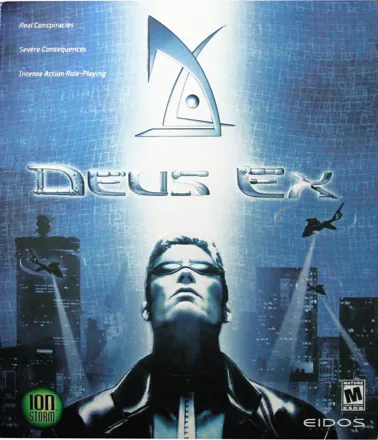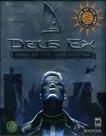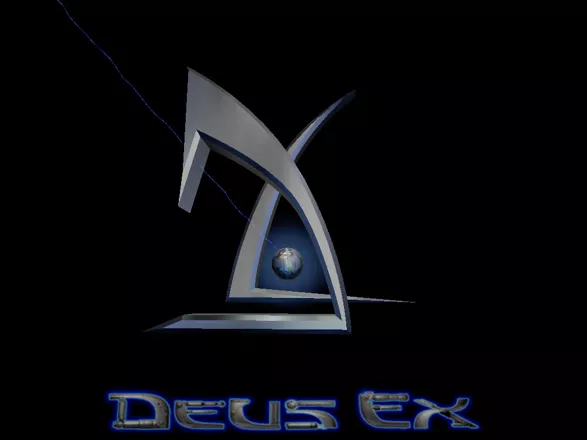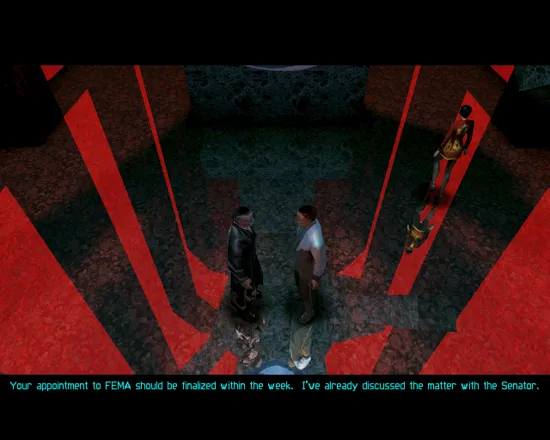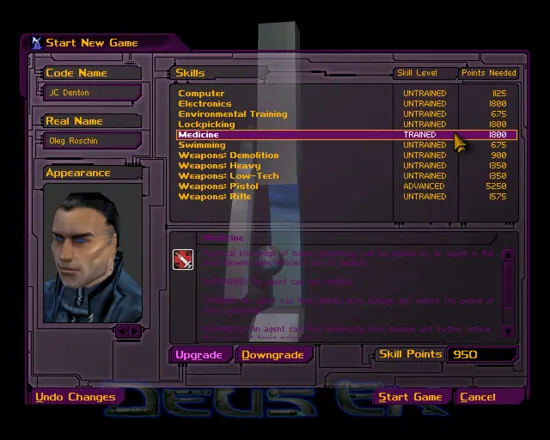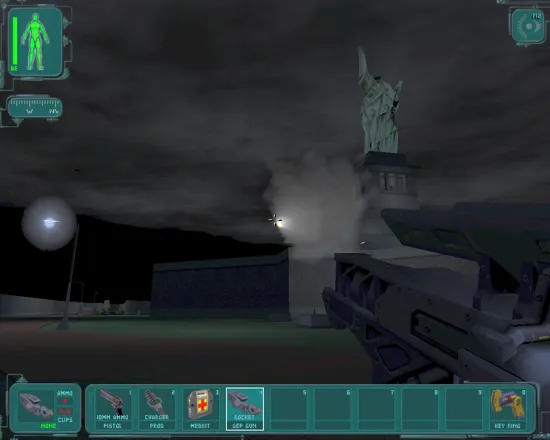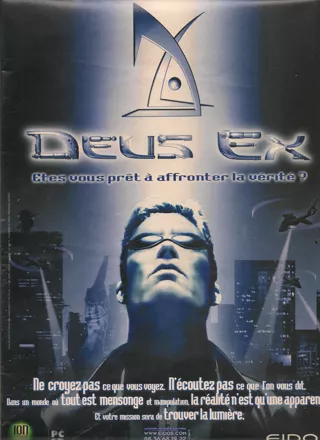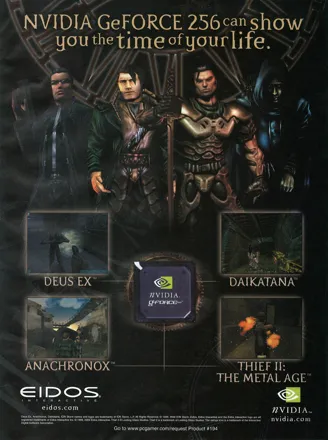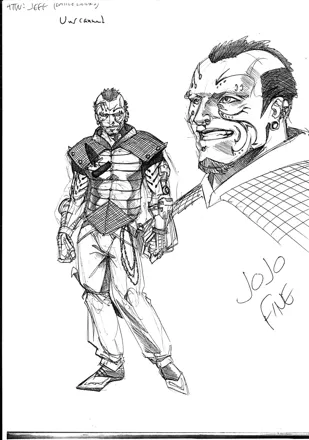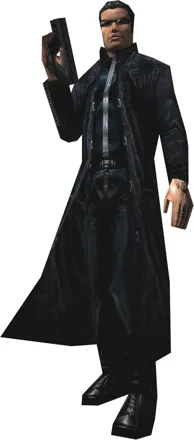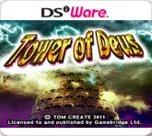Deus Ex
Description official descriptions
Some time during the 2050's, the world is a dangerous place as terrorists, drug czars, and outlaw states rule, using violence and subterfuge as tools in their push for global conquest. A deadly virus dubbed "gray death" is running rampant throughout the world and the only known cure is a chemical known as "Ambrosia" manufactured by the VersaLife corporation. However Ambrosia supplies are scarce and world governments, particularly the United States, carefully monitor and control who receives this cure. As protest against these events, French terrorist organization "Silhouette" bombs the historic symbol of friendship between French and American people, The Statue of Liberty. In response to this attack, the United Nations Anti-Terrorist Coalition (UNATCO) organization is formed. Building a headquarters underground at Liberty Island, its mission is to attack terrorism and maintain peace around the world. JC Denton is a nano-enhanced agent who has been primed for UNATCO service. While JC's brother Paul is already an active agent, JC is beginning his first day of service when the National Secessionist Forces (NSF) suddenly raid a supply of Ambrosia at UNATCO headquarters.
Deus Ex is a dark cyberpunk game that combines gameplay styles of first-person shooter and RPG, with elements of stealth and puzzle-solving. The player assumes the role of JC Denton, UNATCO anti-terrorist agent. Pitted against an elaborate global conspiracy, he must interact with characters, pick up weapons and complete objectives. While JC is essentially fixed within the mission-framework of the game, he can be customized in areas such as weapons, technical skills and physical prowess. Completing objectives rewards the player with skill points, which may be distributed to increase JC's proficiencies in eleven different disciplines. The player can choose to increase the damage JC inflicts with various types of weapons, improve his lock-picking or computer hacking abilities, etc. Each such discipline has four levels of proficiency.
Another way of customizing JC is applying nano-augmentations to his body. These cybernetic implants bestow the hero with super-human abilities, and can be installed on different body parts, up to nine at the same time. Along with combat-related benefits, nano-augmentations also grant JC abilities that can be used to overcome certain obstacles within the game world. Examples of those are jumping to extreme heights, swimming, lifting heavy objects, etc. Weapons can be customized as well: their range, accuracy, and magazine sizes can be increased, and they can be enhanced by attaching scopes, silencers, or laser sights to them.
The game leads JC to various places all around the globe. The cities he visits, as well as most mission areas, are expansive and fairly open to accommodate different approaches to solving the same problems, depending on the player's preferred style of play. Most of the missions can be tackled in various ways, e.g. with brute force, stealth, or extensive usage of lock-picking and computer hacking abilities. At certain points, the course of the storyline can also be influenced by the decisions made by the player. Similarly to System Shock games, the environment is largely interactive, the player being able to pick up, use, and discard various types of objects.
Spellings
- 杀出重围 - Simplified Chinese spelling
Groups +
- 3D Engine: Unreal Engine 1
- Deus Ex series
- Eidos Premier Collection releases
- Gameplay feature: Body dragging
- Gameplay feature: Character development - Skill distribution
- Gameplay feature: Drowning
- Gameplay feature: Grid Inventory
- Gameplay feature: Multiple endings
- Gameplay feature: Radiation / radioactive poisoning
- Games with 451
- Protagonist: Cyborg
- Setting: 2050s
- Setting: City - Hong Kong
- Setting: City - New York
- Setting: City - Paris
- Setting: Country - France
- Setting: Ship / Boat
- Software Pyramide releases
- Theme: Hacking / Pseudohacking
Screenshots
Promos
Videos
Add Trailer or Gameplay Video +1 point
See any errors or missing info for this game?
You can submit a correction, contribute trivia, add to a game group, add a related site or alternate title.
Credits (Windows version)
184 People (144 developers, 40 thanks) · View all
| Producer and Project Director | |
| Lead Programmer and Assistant Director | |
| Programmers | |
| Designers | |
| Dialogue | |
| Additional Dialogue | |
| In-Game Text and Intro/Endgame Cinematics | |
| Art Director |
|
| Lead Artist | |
| Artists | |
| Audio | |
| Music |
|
| [ full credits ] | |
Reviews
Critics
Average score: 89% (based on 78 ratings)
Players
Average score: 4.0 out of 5 (based on 531 ratings with 34 reviews)
The power of this game is in the storyline
The Good
I loved the different locations. Hong Kong was my favorite. I liked the music for the most part. It looked nice, consistent. It was a very fluorescent game. It was cool how you could hack your way through, sneak your way through, or just blast your way through, depending on your mood. You get to blow stuff up! A lot of stuff! The Vandenberg showdown is the single coolest moment in the game, where you hijack a couple of big bots, who start blasting the bad bots, and they're shooting each other for about five minutes. That was at Vandenberg, right?
The best thing about the game was the storyline. The story and dialogue, for a video game, were rich and interesting, and the continuity was nice. You meet interesting people with personality. You travel around the world, learning the truth of conspiracies. I'm kind of a conspiracy fan, so I ate it all right up.
The Bad
There are some nit-picky items that bothered me. The characters acted spazzy and ran around all crazy. It was somehow unsatisfying to fight with standard guns, at least until your skill improved. The ability to blow stuff up with GEP guns and HE20mm and LAMs compensated for this in a big way.
The Bottom Line
This is just fun. It's kind of an intelligent game, so it may turn you off if you're not down with all that fancy book-learning. If you're looking for a game where you just kill your way to the end (and who isn't?), play Half-life. If you're willing to immerse yourself in an interesting story and read a lot of e-mails and such, You'll be rewarded.
Windows · by Thohan (17) · 2004
Not been able to continue this game makes me sad :(
The Good
A while ago I reviewed a game called "Alpha Protocol" and in that review I made the point that a spy-RPG or games about conspiracies in general, are often too difficult to understand and therefore fall flat. Deus Ex however proves exactly how a story about conspiracies can be great; it has a cast of enjoyable characters that frequently appear in the story, there aren't too many factions, plot-points are well explained and there is a lot of detail. I am especially fond of the characters and how you unravel their side-stories throughout the entirety of the game.
Part of the reason for why I am so fond of the characters is that their voice-acting is of an admirable level when compared to other titles at the time. Unlike the characters from the first Half-Life, there are a lot of different voices to be found in this game, including various accents based on the region you are in. It really helps the immersion when you don't hear the same voice, repeating the same four lines of dialogue on every generic NPC you come across.
For some reason I always take the sneaky approach when the option is given to me, which is odd considering I can't stand sneaking games like Splinter Cell. While I am not a professional, the sneaking in Deus Ex seems to be very well executed. You can press X to sneak which makes you move silently and as long as you don't start hugging enemies or cross their line of sight, you can pass them fairly easily. Of course there are also cameras and other security measures to get around, but a nice little extra is the ability to install augmentations that help you avoid detection.
Upgrading is one of the main themes of this game and it works very well. I always say that a good upgrade system allows the player to make the characters their own and specialize in whatever they want, while a bad upgrade system is merely there to justify having money in the game and only forces the player to tweak already existing items/skills. When starting the game my character was very weak and useless, but as I kept playing he would soon grow into an efficient killer. Been skilled in most weapons however meant not having any of the useful skills such as lockpicking, electronics, medicine and demolition.
Along with this great upgrade system comes the game's main selling point, the amount of choice it gives the player. Here is a random scenario: import military storage room with a locked door, what do I do?; scour the area for a key or code?, lockpick the door?, hack the doorpad?, open the door by hacking a security terminal?, look for an alternative way in?, blow the door open?, trigger an alarm to lure a guard out of the door? All of these options are there and I am probably missing out on some. Some ways are more efficient than others, sometimes you will have to combine skills, but it's never impossible to complete a task with a certain set of skills.
Finally I'd like to say that I like it how each part of your body takes damage separately and losing some does not necessarily mean that you die and have to reload a save. Losing both your legs means that you will be dragging yourself forward for example, but that still makes it possible to complete your objectives. This made for a very tense moment when I was at the top of a terrorist-controlled tower and had to drag myself all the way down with no legs, no left arm and all my remaining body-parts in a critical state.
The Bad
The very first problem I would like to mention is that early on in the game objectives would literally solve themselves. A very good example was when I had to find a supply of medicine hidden somewhere in a building, but after running into a dead-end, I decided to go detective on it and find some clues. However, by the time I was ready to resume my search another agent informed me that she has found the supply herself and I can move on. This was really infuriating for me at the time, but this problem disappeared later on.
Most of the time you don't have a map screen and the game expects you to find your way around all by yourself. Most of the time I could manage, but in a level set in Hong Kong I got so insanely tired of endlessly going in circles that I gave up on an important side-quest. This is also annoying because there are many occasions where people will provide information and directions, but if many of these characters are close together you will get so many locations and information thrown at you that it starts to get overwhelming. A map would really help out here, especially if they would mark locations you found information about.
One of the problems that I found particularly odd was that fact that there was a severe lack of resources. You would think an international agency working for a global superpower would send their best agent out with more than just one clip of ammo and a single lockpick. Even in missions I often found mandatory items to be very scarce and sometimes it doesn't even make sense: A soldier spots me and fires two clips of machine gun ammo into my face, I reload and kill him before he sees me, but when I loot him I get a shocking 4 bullets.
The game is also kind of glitchy from time to time and I am not talking about just ordinary crashes. Sprites would often go insane, entire textures would disappear, invisible walls could pop up and the gamma-settings would sometimes go dark. Most of these issues are just annoyances, but for a game this immersive, it's a real kick in the nuts.
One thing Alpha Protocol did better than Deus Ex though was the hacking and lockpicking. In that game you had to do short mini-puzzles that gradually grew in difficulty as the game progressed and if you neglected the related skill. Here every machine/door just tells you how many hacking-devices or lockpicks you are going to need in order to unlock it and all you have to do is click a button. It's a boring chore with no difficulty to it.
The physics engine is kind of disappointing, which might seem unfair, but stick with me. The game allows you to pick up a lot of items, varying from simple pots to entire vending machines. You can also throw these items, but the effect is literally non-existent. Throwing a vial to distract a nearby guard might seem like a clever strategy, but when that vial makes a thick thud as opposed to a load crack, it just seems so silly. The whole point of throwing a vase, is not to throw the thing, but to hear and see it shatter into a dozen pieces, but in Deus Ex is does neither.
The Bottom Line
Deus Ex is often called "The best PC game of all time" and after having played it myself, I can clearly see why. Though it started off very rocky, most of the flaws I mentioned became less apparent as I progressed through the game. The reason for why I can't continue (as stated in the title of this review), is because I accidentally saved right before a huge explosion happened right next to me and I have no extra saves to resume from. As sad as that is, I had fun with Deus Ex and will likely return here one day to finish off the story.
If you are a PC-gamer than you probably owe it to yourself to check this game out, if only to prove yourself in the eyes of the veterans. However, a fan of James Bond and Alpha Protocol will probably find much to love in this game too. If you don't feel much for complex stories or can't put up with the difficulty that comes with PC games from two/three decades ago however, then I recommend looking for your digital entertainment elsewhere.
Windows · by Asinine (957) · 2012
The Bartender reveals much about this games depth.
The Good
There's a key moment in Deus Ex which told me I was playing a great game, one that tries to achieve loftier goals than most. It's a minor one, easy to miss and bears no influence on the plot. It's a conversation with a bartender, I can't remember which bar – there are a lot in the game. Rather than the usual filler dialogue you instead engage the bartender in a deep philosophical conversation about what's happening in the game and whether the organisations in the plot are right or wrong. It's a wonderful chat that came out of the blue. Talking to my friend who I'd borrowed the game from he remembered the conversation too, so it must be quite profound. That it was possible to have that kind of conversation displayed that deep thought had gone into the story and the setting.
I had already realised this by the time I reached that bar, Deus Ex had me hooked despite seeming initially disparaging. The setting seemed so-so like a limited Blade Runner rip-off, it too is set perennially at night - seemingly to limit the amount of detail needed. The first level seemed impossible, as I was endlessly gunned down in an overly-punishing mission that nearly made me give up – but I'm glad I persevered.
After completing this token opening the game completely opened up. No longer was I playing an awkward action game, now it was an adventure-RPG hybrid that seemed to be trying to suck the most out of it's engine. Part millennium conspiracy theory, part stealth adventure, Deus Ex tries to present a plausible near future full of doubt. I'd not played a game before which made you question your actions within the game only to possibly regret them later, creating the strongest aspect to the game. It's a smooth RPG, no levelling up or quests and side-quests - this is about your character. You naturally customise the protagonist the nano-enhanced super soldier JC Denton in his weapons and skills (including non-lethal ones) as you gradually mould his personality and actions to suit your playing style.
The story has conspiracy at its heart and has you travelling the globe to New York, Paris, Hong Kong and more as you unravel the mystery behind NSF terrorists and the 'Grey Death' virus. Before you know it you have to question your motives and why you exist. Ultimately the course of fate lies in your hands.
This is all handled through superb dialogue and creative writing which pops up in newspapers and elsewhere. There's even sections of a novel within the game which questions the games premise. The missions are all open levels, there's no set method or route through allowing you to improvise in a style that suits you. Often guns blazing is the worst but can be satisfying. The open levels are also persistent allowing you to come back later and pick up that important item right where you left it.
The Bad
When I wrote that the game squeezed the most out of it's engine, it's possibly because the engine seems so cumbersome in places. The graphics look blocky with low poly-count models who move in a stiff manner. This is in a world that is always dark, dawn is about the lightest it gets. Whilst I'd like to believe it's purely for mood I'm sure it's also to get away with lower quality textures. It counters the large scale feel to the levels as much of them are shrouded in darkness.
My only other real problem with the game is that opening level which is just too hard. Before I had a handle on the possibilities within the game I had to survive an onslaught with no real indication of how to succeed.
The Bottom Line
Deus Ex deserves recognition as a classic game. It set the tone for open-ended level design, and level design that felt like part of the real world, not simple a set for stunts. The RPG elements work well as you tailor abilities to suit play style. It really improved the standard of game writing making you feel that you had choice – influential choice in a living breathing game world where you could literally change the fate of civilisation. It did all this by putting some serious thought into the question 'why?' a real rarity and in doing so created the best conversation I've ever had with a bartender.
Windows · by RussS (807) · 2011
Discussion
| Subject | By | Date |
|---|---|---|
| Genres | Cantillon (76706) | May 7, 2021 |
| 20th anniversary | Patrick Bregger (299628) | Jun 22, 2020 |
| First original US box design? | sndwv | Aug 28, 2016 |
| Did you know? | Donatello (466) | Jun 23, 2013 |
| Happy birthday! | Patrick Bregger (299628) | Jun 24, 2010 |
Trivia
1001 Video Games
The PC version of Deus Ex appears in the book 1001 Video Games You Must Play Before You Die by General Editor Tony Mott.
Alex Denton
Somewhere in Area 51 (the last stage of the game) you can see a number of containers with clones in suspension. One of them is called Alex Denton. Alex Denton is the lead character to the successor Deus Ex: Invisible War.
Books
Ever wonder about the books found in Deus Ex? The Man Who was Thursday by G.K. Chesterton is a real book written in 1901, and takes place in a fantasy version of Victorian England, in which anarchists take names of days of the week it has some similarities to Deus Ex. G.K. Chesterton also wrote a book about St. Thomas Aquinas whom is referenced several time in Deus Ex.
One of the many books you can read in Deus Ex is the beginning of The Eye of Argon by Jim Theis. This is a real book, considered by many to be the worst fantasy book ever written. Information about the book and the full text can be found online.
Cancelled Linux version
The Linux version of Deus Ex was supposed to be ported by Loki Entertainment Software. Unfortunately, they went bankrupt back in 2001. Although their company website still exists, it (obviously) hasn't been updated. The status of Deus Ex in the website is "coming soon". Not likely.
Non-lethal
Due to the array of non-lethal weapon and the numerous stealth options, it is quite possible to finish the game having only killed three people. That's a pretty non-violent option for a first person shooter! With the explotation of glitches, the number can be dropped to one.
References
- There's a register in the hotel at the Hell's Kitchen location... click on it and you will see that the last name is Hyppolita Hall... a character from the Sandman comic books.
- One of the computer passwords used in the game, "reindeerflotilla", is actually a reference to the 1982 movie Tron, where it was used by Flynn to hack into the computer network and challenge the MCP (the time when he's actually inside the Encom building).
- The helicopter pilot Jock with which J.C. Denton allies himself in the game is possibly a reference to the movie Raiders of the Lost Ark. In the opening scenes of that movie, Indiana Jones makes a getaway in a biplane, flown by a pilot also named Jock.
- Main voices of JC Denton and Agent Navarre are eerily similar to the protaganists of Nocture... as well as their general appearances.
- A couple of tidbits. JC Denton was supposed to have a famous ancestor with the Initials J.C. If you look at the game logo, you see a very stylized J and C rotating around a tiny sphere.
- Castle Clinton, as well as the Statue of Liberty, are real buildings represented in the game as playable maps.
- In the hotel, in NYC, check the guest register. One entry is, Gabriel Syme, from London, England. Syme was the title character in the novel, The Man Who Was Thursday.
Special edition
Beware the "special edition" that's being sold for $9.99 in bargain bins at Best Buy, Circuit City, Target, etc. This is a one-level demo being passed off as a full retail version. Unlike other legitimate bargain bin software, the Deus Ex being sold in the bargain bin section is only a demo and not the full game.
Eidos has a nasty habit of releasing game demos disguised as full retail versions and pedalling them in bargain bin software racks (they've done this previously with Tomb Raider). Nowhere on the packaging is it mentioned the "special edition" is a demo and not the full retail version of the game.
Title
The title "Deus Ex" comes from the latin term deus ex machina. It means- 1. A god introduced by means of a crane in ancient Greek and Roman drama to decide the final outcome. 2. A person or thing (as in fiction or drama) that appears or is introduced suddenly and unexpectedly and provides a solution to an apparently insoluble difficulty.
Twin Towers
If you run around Liberty Island, you can see the New York skyline. The Twin Towers are missing because allegedly, they were destroyed by terrorists. This was a design decision for a game released before September 11, 2001.
Voice acting
Lots of Ion Storm employees were used as voice actors. Tom Hall plays the villain in the game; Jay Franke, a QA tester, played the protagonist. He used to be on the TV sitcom California Dreams.
Awards
- GameSpy
- 2000 – Game of the Year
- 2001 – #18 Top Game of All Time
- 2011 – #3 Top PC Game of the 2000s
- PC Gamer
- 2000 - Game of the Year
- October 2001 - #10 in the "Top 50 Games of All Time" list
- April 2005 - #27 in the "50 Best Games of All Time" list
Information also contributed by Adam Baratz, Alan Chan, Dr. M. "Schadenfreude" Von Katze, emanjonez, Entorphane, Jason Musgrave, jeremy strope, MasterMegid, PCGamer77, Ryan Prendiville, Scott Monster, Stephen Atkinz; Tomer Gabel and WildKard
Analytics
Upgrade to MobyPro to view research rankings!
Related Sites +
-
Deus Ex HDTP (High Definition Texture Project)
Deus Ex lives and will soon look cooler than ever in hi-res! -
Deus Ex Incarnate
Check up on Deus Ex news, walkthroughs, and tips on this site. -
Deus Ex Machina
See Deus Ex articles, interviews, polls, and screenshots at this site. -
Deus Ex Post-Mortem (1/2)
Warren Spector and Harvey Smith speak about the development process of Deus Ex (Youtube, part 1/2) -
Deus Ex Post-Mortem (2/2)
Warren Spector and Harvey Smith speak about the development process of Deus Ex (Youtube, part 2/2) -
Postmortem: Ion Storm's Deus Ex
Gamasutra article by Warren Spector about the development process of Deus Ex -
Something Awful review
A humorous review on Something Awful (PC version) -
The Making Of: Deus Ex
A retrospective of Deus Ex at EDGE Online, provided by Warren Spector, which covers the game's development and struggles (September 11th, 2009). -
The Nameless Mod
A total conversion which features the main gameplay advantages of Deus Ex with a completely new plot. Also includes full voice acting and two mostly separate story branches. -
Wikipedia: Deus Ex
Information about Deus Ex at Wikipedia
Identifiers +
Contribute
Are you familiar with this game? Help document and preserve this entry in video game history! If your contribution is approved, you will earn points and be credited as a contributor.
Contributors to this Entry
Game added by rstevenson.
PlayStation 3 added by GTramp. Macintosh added by Kabushi. PlayStation 2 added by NeoMoose.
Additional contributors: MAT, Adam Baratz, Unicorn Lynx, Shoddyan, Zeppin, DreinIX, Zeikman, Patrick Bregger, FatherJack.
Game added June 25, 2000. Last modified March 31, 2024.
